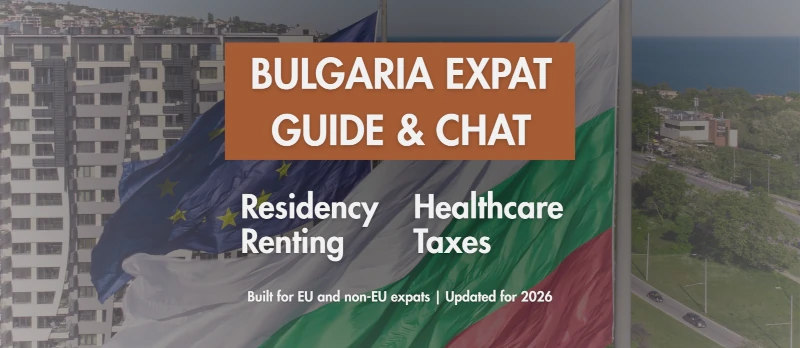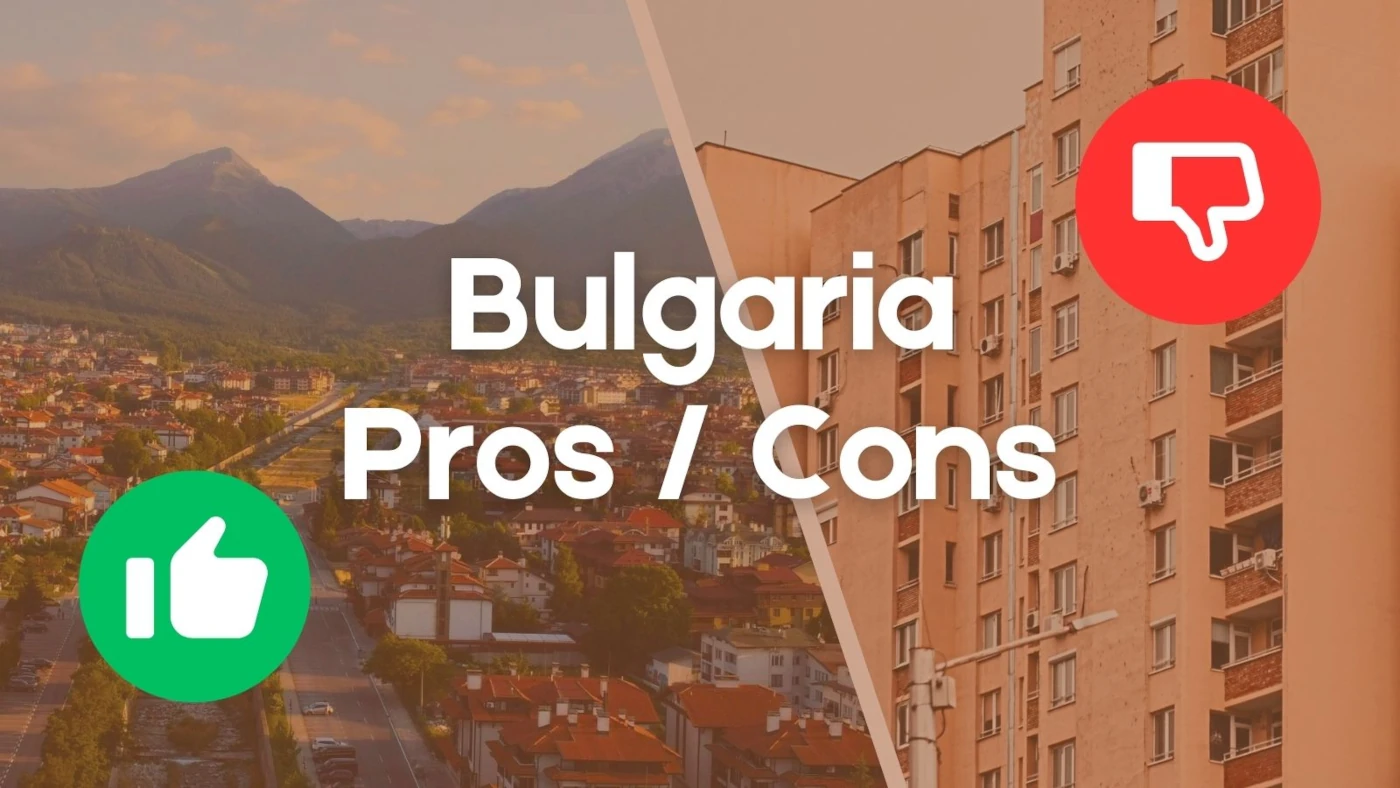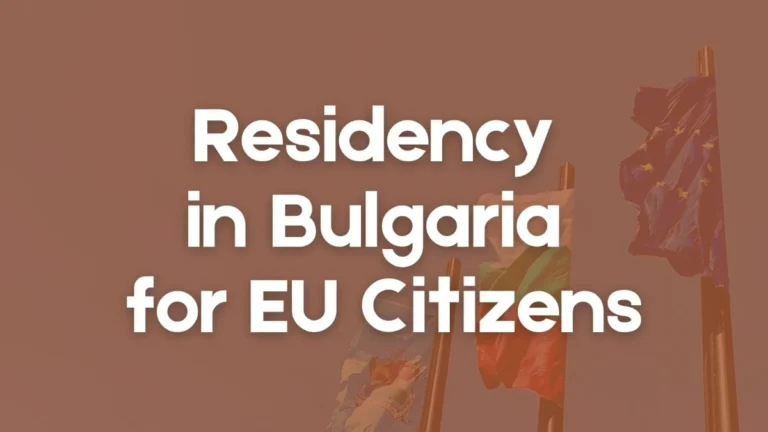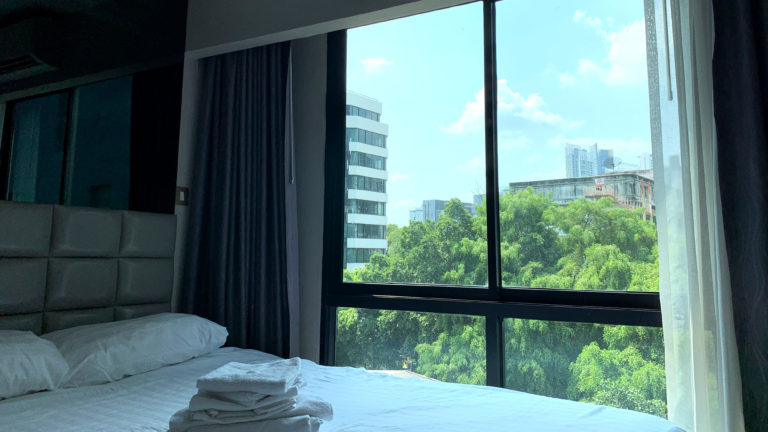Is Bulgaria really one of Europe’s best-kept secrets — or is it simply not the right fit for everyone?
After living in Sofia for a full year, I’ve experienced both sides. This article is not just a list of facts pulled from the internet or generated by ChatGPT — it’s built from real-life experience. The good, the frustrating, and the parts no one talks about until you live them.
Bulgaria is often mentioned as a budget-friendly destination for retirees and remote workers from EU, but there are trade-offs most people don’t talk about. If you’re planning your relocation or actively comparing European countries, this guide will help you decide whether Bulgaria truly fits your goals. It’s not about romanticizing the lifestyle or sugarcoating the downsides — it’s about giving you the full picture so you can make the right decision for your situation.
Looking for how to relocate to Bulgaria? I’ve helped other expats through this process.
→ Download my FREE Bulgarian Residency Checklist (includes documents needed for EU and non-EU citizens)
→ Get the Bulgaria Relocation Guide + Expat Q&A Chat (Lifetime Access)
→ Or let me help you with getting a Residence Permit in Bulgaria
Living in Bulgaria as an Expat: Residency and Bureaucracy
If you’re considering living in Bulgaria, securing legal residency is the first major step. It can be surprisingly straightforward compared to other EU countries—but only if you qualify under one of the easier paths and know what to prepare for.
Pros
- EU citizens can apply for a five-year long-term residence permit in Bulgaria almost immediately upon arrival. After five years, they can become eligible for permanent residency.
- Non-EU citizens may qualify through several routes: retirement income, family reunification, or business representation (such as the trade representative office route).
- Bulgaria’s residency requirements are more accessible than many other EU countries, with lower income thresholds and simpler documentation.
- Once approved, the residency card functions as a national ID. It’s essential for renting long-term, setting up utilities, registering with the tax office, and accessing services.
Cons
- Non-EU citizens typically receive a one-year permit that must be renewed annually for five years before they can apply for permanent status. Each renewal adds administrative burden.
- There’s limited English-language support at most Migration Offices. Many official forms and notices are only in Bulgarian (Cyrillic), which can make things feel more opaque and stressful.
- Information online is often incomplete or outdated. You might find a list of required documents but still not know how to meet the specific requirements (e.g. what kind of apartment contract qualifies or how to get accepted insurance).
- Mistakes—especially during your first application—can lead to delays or rejections. Most issues stem not from major errors, but from missing minor, undocumented details.
Read More:
How to Retire in Bulgaria as a Non-EU Citizen (2026 Guide)
Getting Residency in Bulgaria as an EU Citizen: Requirements, Process & Benefits
Practical Help for Expats
To simplify the process and avoid common missteps:
- Get my free up-to-date Residency Checklist (includes lists of documents for EU, Non-EU and retirees).
- If you want clarity and peace of mind, I also offer ongoing chat support, 1-1 consultations, and full application assistance.
Once residency is secured, most expats in Bulgaria find the rest of their setup—like housing, taxes, and insurance—goes much more smoothly. But those first few weeks can be overwhelming if you’re on your own.
Living in Bulgaria as an Expat: Cost of Living
Many expats in Bulgaria are drawn by the promise of affordable living — and in some areas, that promise holds true. But not everything here is cheap, and the reality depends a lot on your lifestyle and income level.
Pros
- Day-to-day expenses are modest. Groceries, public transport, utilities, and basic services generally cost less than in Western Europe — around 10–20% lower.
- Eating out is still affordable. You can find lunch menus for €5–€7 and casual dinners for two for under €30 in many places.
- Local SIM cards and mobile data are fast, reliable, and cheap — often under €10/month for generous plans.
- No need to own a car in major cities like Sofia, which cuts down on transportation costs.
Cons
- Not as cheap as expected. Bulgaria isn’t a budget destination on the level of Southeast Asia. Imported products, tech, and high-quality food can be pricey.
- Rising inflation. Prices — especially for groceries and dining out — have been rising in recent years, narrowing the gap with Western countries.
- Lower-income expats may struggle. If your monthly budget is under €1,500, you may find it hard to cover everything comfortably in Sofia. In smaller cities or villages budget of €1000-1500 per person would still be enough, especially for retirees.
Living in Bulgaria still offers good value for many — but it’s not a one-size-fits-all bargain. And for remote workers or retirees, it’s not the groceries or cafes that make the biggest difference — it’s how you manage housing, taxes, and healthcare.
Living in Bulgaria as an Expat: Housing and Rentals
For many expats living in Bulgaria, housing is where the biggest savings (or losses) happen. It’s not about €1 coffees — it’s about locking in a decent apartment at the right price.
Pros
- Reasonable long-term rent. In Sofia, a renovated 2-bedroom in a good location usually rents for €600–€850/month. For the price of a room in Amsterdam (shared with 2–3 roommates and a single bathroom), you can rent a 2-bedroom apartment in central Sofia — giving you the flexibility to set up a home office or grow your family in peace.
- It’s still a renter’s market. Even in Sofia, there’s a lot of availability. You’re not competing with dozens of people for each apartment like in many Western European cities.
- Straightforward rental process. You typically only need a deposit, the first month’s rent, and an agent’s fee to move in — no employment proof or salary checks.
- Fast move-in. You don’t need to wait for weeks or months.
- Many furnished apartments available. You don’t need to spend thousands of euros on furniture or appliances unless you want to. Which makes it easy to change apartments after the first year if you want to move somewhere else.

Stuck in research mode?
Where to live?
Which documents do you need?
Do you register as a freelancer or as a company?
How to pay taxes?
Is Bulgaria even the right choice for you?
I’ve been there.
That’s why I created this Chat & Guide — so you don’t have to spend weeks in research mode, guessing your way through bureaucracy, or worrying about mistakes that could cost you time and money.
Cons
- Foreigners often overpay. Especially in their first year, many expats get quoted inflated prices or shown low-quality units, often by agents eager to close a deal.
- Difficulty enforcing rental laws as a foreigner. If something goes wrong with your rental, not speaking Bulgarian makes it much harder to resolve the issue or assert your rights. Though that’s a common challenge in any foreign country.
- Many older buildings. Socialist-era apartment blocks are still common in many areas — but newly built neighborhoods do exist, and you do have a choice.
Tip: The difference between a great deal and a bad one often comes down to local knowledge. In my Relocation Guide, I explain how to avoid the usual traps, choose the right neighborhood, and understand what to look for in listings — especially as a first-time renter in Bulgaria.
Living in Bulgaria as an Expat: Taxes and Social Security
One of the most talked-about reasons expats consider living in Bulgaria is its attractive flat tax rate. But the full picture includes important caveats — especially for freelancers, retirees, and remote workers.
Pros
- Flat 10% tax rate for both personal income and corporate profits — one of the lowest in the EU.
- Social security contributions are capped. You won’t pay endlessly higher amounts as your income grows. In 2026, the maximum monthly contribution is just over ~250 EUR.
- Freelancers benefit from expense deductions. If you register as a freelancer, 25% of your income is automatically considered tax-free. No receipts needed.
- No tax on foreign pensions and no social security payments for non-EU retirees. For tax residents, pensions are exempt from Bulgarian income tax, whether public or private. This makes Bulgaria attractive for retirees.
Cons
- Social contributions can significantly raise your effective tax burden — especially if your income is under €2,000/month. Between healthcare, pension, and other contributions, your real out-of-pocket may approach 35–50%.
- Low-income remote workers may not benefit. If you earn below ~€2,000/month, your social contributions might eat up any tax savings. For this income group, living in Bulgaria may feel more expensive than expected.
- Initial setup and compliance can be confusing. Many expats need help from an accountant or consultant to register correctly and stay compliant.
Key takeaway: For remote workers, if your income is above €3,000–€4,000/month, living in Bulgaria becomes extremely cost-effective compared to countries with progressive taxation like Germany, Spain, or the U.S. But if you’re earning less, the savings may not justify the move.
Want to understand which tax setup fits your case best? I break down options for freelancers, remote workers, and retirees in my Relocation Guide, and to an English-speaking Bulgarian accountant whose services I’ve personally used.
Living in Bulgaria as an Expat: Transportation & Infrastructure
In my cost of living video above, I didn’t include the cost of buying or maintaining a car. That’s because in Sofia, we simply don’t need one. But that’s not the case everywhere in Bulgaria — and this is where infrastructure becomes a real dividing line.
Pros:
- Excellent public transport in Sofia. The capital has a well-connected metro, tram, and bus system. Tickets are inexpensive, and travel across the city is relatively fast.
- Walkable city centers. In cities like Sofia, Plovdiv, and Varna, you can comfortably live without a car. Sidewalks, while not perfect everywhere, are usable and the layout is more pedestrian-friendly than most of Southeast Asia, for example.
- Easy access to nature. Vitosha mountain is right next to Sofia and reachable by public transport. Short weekend trips are doable without a car if you’re based in the capital and renting is easy for longer trips.
- International travel is easy. Sofia Airport is small but efficient, with regular flights across Europe and good year-round service for further destinations via hubs like Istanbul or Vienna.
Cons:
- Small towns have little to no public transport. If you’re planning to live in a village or even in a smaller city like Bansko, you’ll likely need a car. Public transport is sparse or nonexistent.
- Not all neighborhoods are walkable. Some areas lack proper sidewalks or feel disconnected from central infrastructure. Your experience will heavily depend on where you choose to live.
- Sofia’s airport has limited long-haul routes. For flights to Asia or the Americas, you’ll need to connect through other hubs.
- Intercity trains and buses tend to lack comfort.
The bottom line: if you plan to live car-free, Sofia is by far your best option. Anywhere else — you’ll likely need to drive.
Living in Bulgaria as an Expat: Healthcare in Bulgaria
One of the biggest pros of relocating to Bulgaria — surprisingly — is healthcare.
Even though Bulgaria is often seen as a “less developed” country compared to Western Europe or the U.S., many expats find the healthcare here faster, more accessible, and significantly more affordable. As a resident, you can often get better care at a lower cost than you would back home — especially if you’re used to long waitlists or overpriced private systems.
Pros:
- Fast access to private doctors and specialists
You can usually book an appointment with a specialist — from a neurologist to a gastroenterologist — within days, not months. There’s no need for referrals or gatekeeping GPs like in the UK or the Netherlands. If you’re paying out of pocket, you’re seen quickly. - Affordable private care
A private visit with a doctor typically ranges from 50 to 100 EUR, even with diagnostics like an ultrasound or scan. An MRI might cost between 200–400 EUR, often scheduled within the same week. For many expats, this is a game changer — timely, advanced care at a fraction of the cost back home. - Public healthcare for EU citizens and long-term residents
Once you register as a long-term or permanent resident, or if you’re an EU citizen contributing to the system, you’re entitled to public healthcare coverage. Many services are free or symbolic in cost (under 5 EUR per visit), especially with a GP. - English-speaking doctors are available
In major cities like Sofia, it’s possible to find English-speaking GPs, specialists, and private clinics. It’s not guaranteed everywhere, but you won’t be alone navigating the system — especially if you’re using paid services.
Cons:
- Public healthcare can be hit or miss
While the private sector is generally fast and efficient, public healthcare can involve long wait times, lack of availability for some specialties, or outdated equipment. Some expats still prefer to use private providers even when they’re entitled to public care. - Non-EU citizens don’t get public coverage right away
If you’re a non-EU resident in your first five years (on temporary residence), you’re not eligible for the national health system — even if you’re paying taxes. You’ll need to rely on private care or buy international insurance until you become a long-term resident. - Smaller towns may have limited options
Outside of Sofia, Plovdiv, and Varna, the availability of English-speaking doctors and specialists is more limited. In smaller towns, you may need to travel for care or navigate language barriers with assistance.
Living in Bulgaria as an Expat: Local Mentality, Expat Communities & Banking
Understanding the local mentality and the realities of social life in Bulgaria is essential if you’re considering relocation. While many parts of daily life are easy to adjust to, others require a shift in expectations — especially when it comes to making friends, finding your community, and dealing with institutions like banks.
Pros
- Less small talk, but more genuine friendships
Bulgarians generally aren’t overly chatty or outwardly enthusiastic — which can feel cold at first if you’re used to places like the U.S., Portugal, or Southeast Asia. But once trust is built, friendships here tend to be deep, supportive, and long-lasting. Many expats appreciate this cultural trait over time. - Expat events and international connections
In cities like Sofia, Plovdiv, and Varna, it’s easy to find English-speaking events, international meetups, or co-working communities. While the foreign population is smaller than in hotspots like Lisbon or Barcelona, that often makes connections more meaningful and less transactional. - A growing network for newcomers
The expat groups I’ve created — including my private Bulgaria Q&A chat — are focused on connection and practical support. They exist to bridge the gap for people who are new and don’t want to deal with sarcasm, gatekeeping, or vague answers in public forums.

Stuck in research mode?
Where to live?
Which documents do you need?
Do you register as a freelancer or as a company?
How to pay taxes?
Is Bulgaria even the right choice for you?
I’ve been there.
That’s why I created this Chat & Guide — so you don’t have to spend weeks in research mode, guessing your way through bureaucracy, or worrying about mistakes that could cost you time and money.
Cons
- Online expat groups can feel unwelcoming
Some Bulgaria-focused Facebook or Telegram groups can be hit or miss. Newcomers often get brushed off when asking questions or are told to “search the archives,” without real engagement. This can feel alienating if you’re looking to connect or get practical advice fast. - Customer service culture is still developing
Don’t expect enthusiastic greetings or “service with a smile” in every interaction. While many waiters, doctors, and private professionals are kind and helpful — especially in Sofia — bureaucratic offices and banks may not always meet Western expectations for communication or flexibility. - Banking can be a hassle for foreigners
Opening a local bank account as a foreigner — especially without a job contract or Bulgarian company — can be surprisingly difficult. Some banks refuse based on unclear criteria, and there’s little room for negotiation or explanation. If you don’t absolutely need a local bank account (for example, to start a business), you can easily rely on international online banks or money transfer systems. They work well in Bulgaria and are accepted nearly everywhere. For EU citizens, banking will get even easier when Bulgaria joins the Eurozone (currently scheduled for January 2026). That means you can continue using your home country’s bank card without worrying about conversion fees or local access.
Living in Bulgaria as an Expat: Weather & Climate
Pros
One of the first things people get wrong about living in Bulgaria is the climate. If you’re used to gray skies and long, wet winters in Northern Europe — or relocating from North America — Sofia’s winters might surprise you.
Yes, it gets cold. But the air is dry, the skies are often sunny, and the chill doesn’t feel as bone-deep as in damp climates. In Sofia, average winter temperatures hover around 0°C (32°F), but many days are bright and pleasant. Snow comes and goes, but it’s not months of endless slush. And spring arrives early, bringing clear days by March.
Another big advantage is the extended warm season. From April to late October, you can enjoy real warmth — with average summer highs around 30–32°C (86–90°F) in Sofia and other inland towns. Long evenings, dinner outdoors, and weekend escapes into nature are a way of life here for much of the year.
And if you’re wondering whether apartments can handle the heat: most modern or renovated rentals, including the ones we recommend in our budget range, come with AC. You don’t need to suffer through summer. Just make sure to choose the right apartment — not all older buildings have been updated.
If you love sunshine and clear seasons — but can’t stand six months of darkness — Bulgaria hits a very livable sweet spot.
Cons
That said, it’s not for everyone. If you’re used to tropical winters (like in Southeast Asia) or year-round spring weather (like in the Canary Islands), Bulgarian winters will feel harsh. We personally got spoiled by warm winters abroad — and while the sunshine helps, we’re still considering short escapes to warmer places during the coldest months.
And the heat? It can get intense in July and August, especially in older apartments without AC — or in cities like Plovdiv, where temperatures can climb even higher than Sofia.
So what’s the bottom line?
If you enjoy having all four seasons without the extremes, Bulgaria offers one of the best climates in Eastern Europe. You’ll get sunny winters, long summers, and early springs — without the price tag of more famous destinations. And if you don’t want to stay for winter? That’s easy to work around too.
Looking for how to relocate to Bulgaria? I’ve helped other expats through this process.
→ Download my FREE Bulgarian Residency Checklist (includes documents needed for EU and non-EU citizens)
→ Get the Bulgaria Relocation Guide + Expat Q&A Chat (Lifetime Access)
→ Or let me help you with getting a Residence Permit in Bulgaria








